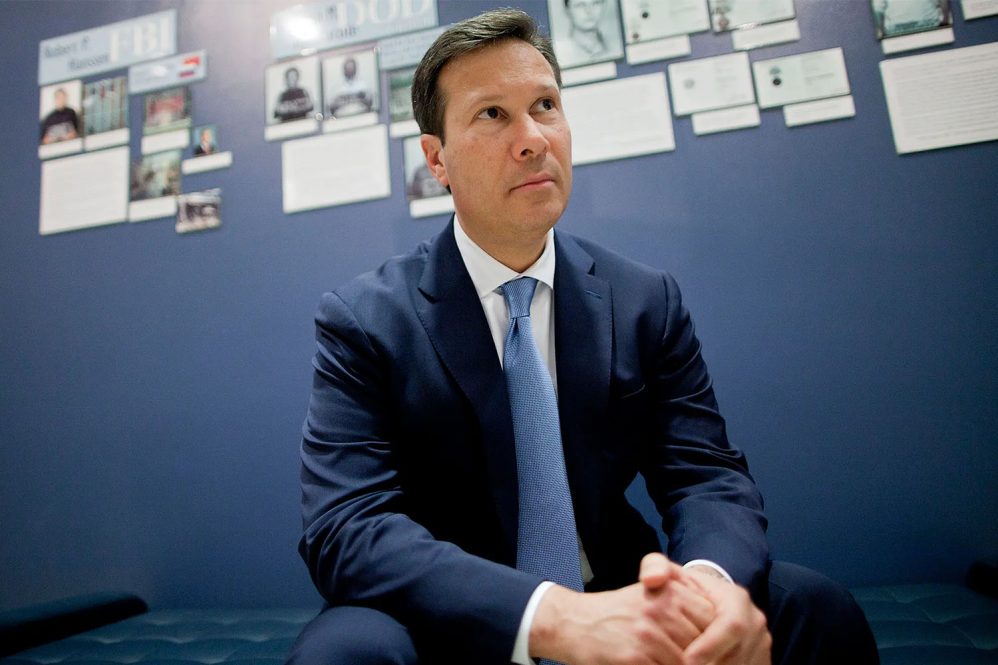The first time Frank Figliuzzi ’87 JD applied to be an FBI agent, he was turned down.
He was disappointed — but then again, he was only 11 years old.
“I loved the old Sunday night TV show ‘The FBI’ with Efrem Zimbalist Jr.,” says Figliuzzi. “These guys would solve every problem in the world in less than an hour — and they wore suits.”
When Figliuzzi was two, his father moved the family from Port Chester, New York, where he’d owned a small Italian foods shop, to New Fairfield, Connecticut, to become a regional manager for ShopWell foods. Young Frank loved the idyllic suburbs, but found the city more exciting.
“As a kid growing up in southern Connecticut, our news came from the New York media market, stories of the FBI breaking up the mafia. These guys using their brains for justice and equality.” Inspired, he wrote a letter to the New Haven field office, asking the head of the FBI in Connecticut for a job. “The guy wrote me back and said, ‘Here’s what you need to do — get back to us in about 15 years.’”
Figliuzzi’s career plan, never wavering, was met with all manner of skepticism along the way. An uncle told him at a family gathering, “I don’t think it’s gonna work, because we’re Italian, and I don’t think they like us.” Undaunted, he gained a bachelor of arts in English from Fairfield University in 1984, the first in his family to earn a college degree, and went on to get his law degree, with honors, from UConn in 1987. He knew a law degree would be attractive to FBI recruiters but says his classmates scoffed.
“They looked at me like I was crazy. ‘You’re gonna live on a government salary?’ They were all trying to become a partner in some law firm. Within a couple of years, those same classmates were calling me, saying they couldn’t stand the lack of integrity at their law firm, or they were bored out of their minds, and how could they get an application to the FBI?”
Integrity has always mattered to Figliuzzi, who became an agent almost exactly 15 years after writing that letter and the same year he got that law degree. He worked in Atlanta, San Francisco, Silicon Valley, and at FBI headquarters in Washington, D.C., where he was a unit chief in the Office of Professional Responsibility, the FBI’s Internal Affairs component. In 2001, after the 9/11 attacks, he headed the Joint Terrorism Task Force in Miami, where many of the attackers had trained, and where the government feared more were hiding.
A week after 9/11, anthrax powder was discovered in the Boca Raton mailroom of American Media, publisher of the National Enquirer. Al Qaeda was suspected at first, though the search ultimately led to a home-grown government scientist. Figliuzzi directed the FBI investigation from a trailer in the parking lot outside the American Media offices.
“It’s a 60,000-square-foot, three-story building, filled with microscopic, deadly anthrax spores that killed somebody, and we’re doing hazmat entries into the building. Meanwhile, I see kids getting on school buses. I see people out for their morning run, oblivious to the fact that down the street, an incredibly deadly attack has occurred. But that’s why we have the FBI, to take that kind of burden on, so that everybody else doesn’t have to worry about it.”
That sense of mission and honorable purpose has animated Figliuzzi’s life from the first day he set foot in the FBI Training Academy in Quantico, Virginia. After Miami, he became Chief Inspector and led the Cleveland Division in 2004. In 2011, he was named Assistant Director of the Counterintelligence Division, the nation’s top spy-catching agency. Over his 25 years of service, he watched the FBI change from an organization that primarily investigated crimes after the fact to one that tried to predict and prevent them.



